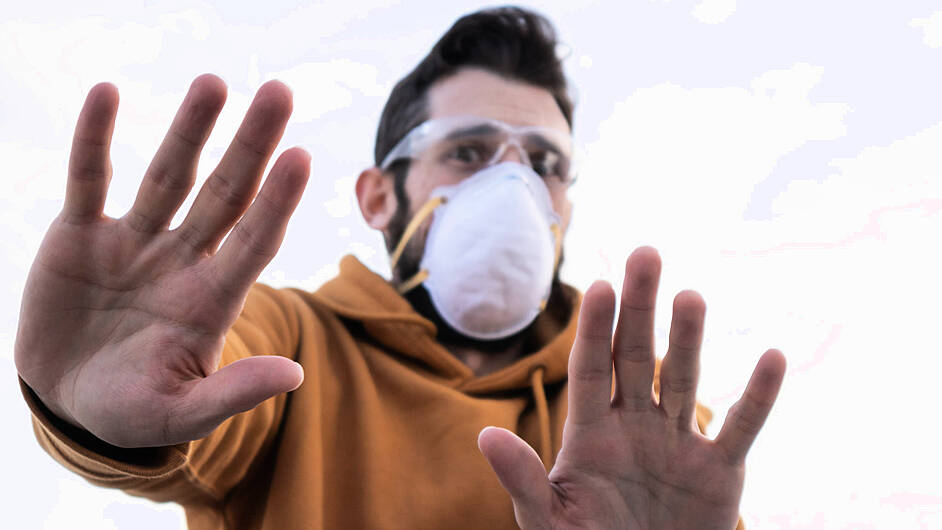BY Linda Hamilton Cognitive behavioural therapist
THE first thing to say is it’s perfectly normal to be anxious right now. People are concerned about their health and the welfare of their loved ones, particularly elderly family members and vulnerable people with underlying medical conditions. Besides the health concerns, many are worried about their finances, particularly people working in the tourist and hospitality industries. People have had to make profound changes to their day-to-day life, so it’s natural that many people are unsettled and anxious.
It’s important that understandable feelings of anxiety are not allowed to run riot as that only makes a bad situation worse. Catastrophising and panicking are not helpful.
That said, neither is escapism. In the early days of the coronavirus crisis, many people were quick to play down the threat, comparing it to the flu and saying there was too much hysteria about the subject. There are many reasons for this response, but I think one of them is many people sought to cope with the growing uncertainty by taking a “t’will be grand” attitude; rather than sitting with their feelings of discomfort, they instantly ran from them. It’s important to remember that anxiety disorders are characterised not only by overestimation of risk (“OMG, something terrible will happen”) but by underestimation of coping resources (“I can’t handle this”).
It’s important to learn to tolerate anxiety. Running from unpleasant feelings is not a healthy response. One of the great ironies about anxiety is the more willing you are to experience it, the less likely you are to suffer from it. Anxiety is uncomfortable, but it doesn’t have to be intolerable. Saying “I’m feeling anxious right now but I can cope with that” is much healthier than saying “let’s not talk about it, t’will be fine”.
Worrying attracts more worry
The above point doesn’t mean it’s good to worry – far from it. Decades of psychological research confirms anxious people have positive beliefs about worry, such has “worry keeps me safe”, “worry show I care”, “it’s irresponsible not to worry”. Worry gives an illusion of control and tends to be mistaken for problem-solving, but the two are very different. Problem-solving is constructive; you identify what the problem is, come up with ways of dealing with it and then follow your plan as best you can. With worry, you just come up with more worries; it doesn’t advance you in any way. Right now, it’s important to follow HSE guidelines regarding washing hands, not touching your face, social distancing and so on. It’s understandable that you may find yourself worrying about various scenarios, but don’t make the mistake of thinking this worry is productive or helpful; it’s not.
Stay informed, not overloaded
The constant stream of news reports about the coronavirus outbreak can add to feelings of anxiety, especially if you’re stuck inside with little to do. It’s important to be informed, but you don’t need to be overloaded with information, especially if it adds to existing feelings of stress. You can get practical guidance and important information updates from the HSE and World Health Organisation (WHO) websites. Checking reputable sources once or twice a day will help you plan and keep you informed, but don’t feel obliged to catch every news bulletin. As UCD Professor Psychology Dr Paul D’Alton noted last week, the non-stop coronavirus media cycle is “unhelpful at the very least, if not irresponsible on the part of broadcasters”.
Alcohol and junk food won’t help
Aim to employ helpful coping strategies – whatever works for you, you know best – in this difficult time. Avoid unhelpful coping strategies such as alcohol and junk food, which bring short-term relief but which hurt your mental and physical well-being. Getting outdoors is always good. Keeping your distance from people doesn’t mean we isolate ourselves; try to stay in touch with friends and family via Skype, FaceTime and so on. Consider how you can support others in their hour of need; this will likely benefit you as well as the person being helped.
No need to freak out
Finally, try to keep a sense of proportion. As psychologist Dr Ethan Kross told Wired magazine, we want to maintain a sense of gravity about the situation but we don’t “need to freak out when doing it”. Life is tough right now, but this too shall – eventually – pass.








